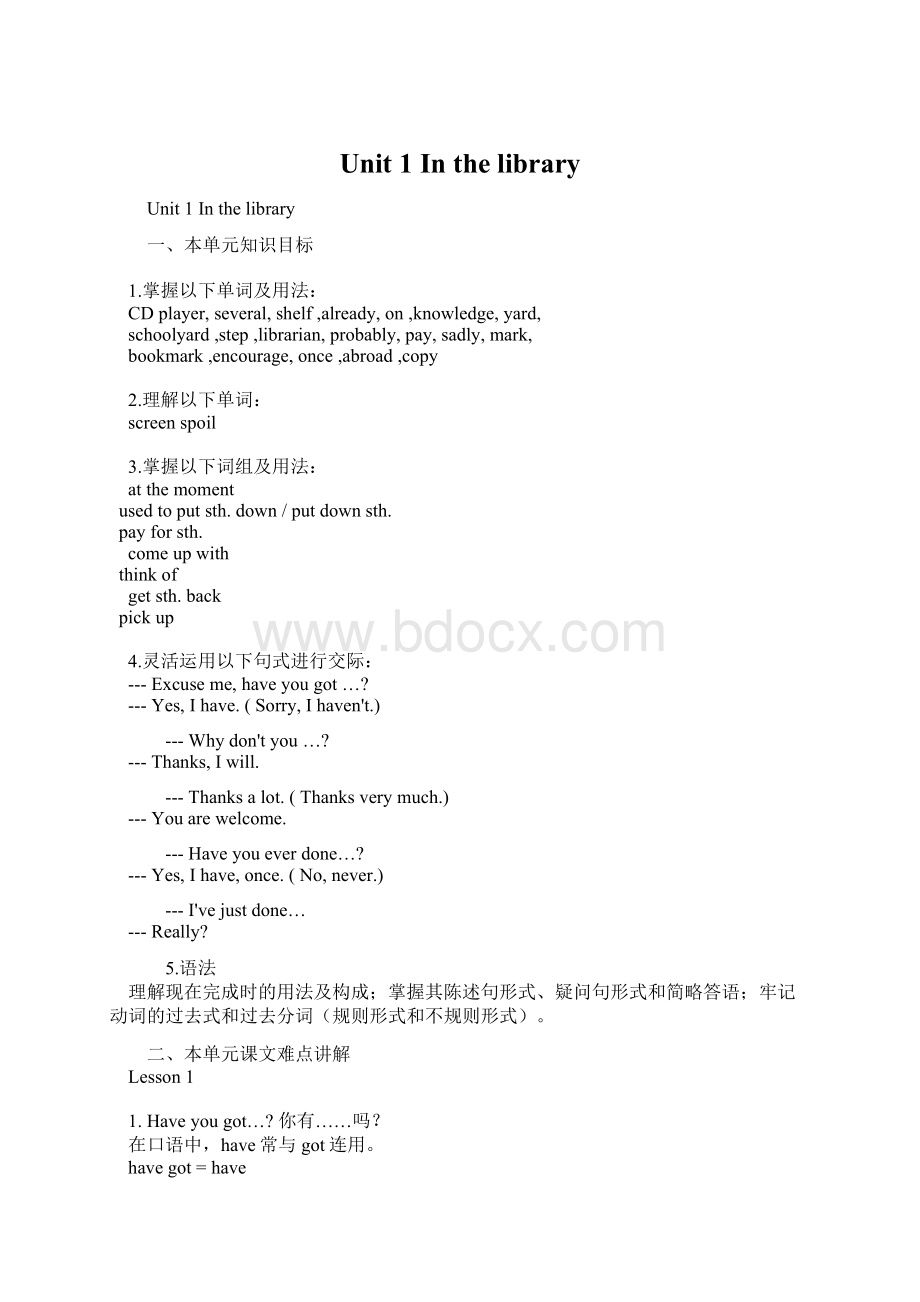Unit 1 In the libraryWord下载.docx
《Unit 1 In the libraryWord下载.docx》由会员分享,可在线阅读,更多相关《Unit 1 In the libraryWord下载.docx(10页珍藏版)》请在冰豆网上搜索。

---Really?
5.语法
理解现在完成时的用法及构成;
掌握其陈述句形式、疑问句形式和简略答语;
牢记动词的过去式和过去分词(规则形式和不规则形式)。
二、本单元课文难点讲解
Lesson1
1.Haveyougot…?
你有……吗?
在口语中,have常与got连用。
havegot=have
Haveyougot…?
=Doyouhave…?
eg.Ihavegotnoideawheretogo.我还没有决定上哪。
=Ihavenoideawheretogo.
HaveyougotanypenfriendsinAmerica?
你在美国有笔友吗?
=DoyouhaveanypenfriendsinAmerica?
2.Theyareonthatshelf.它们在那个架子上。
shelf变复数,改f为v,加es:
shelf---shelves
类似的以f或fe结尾的名词变复数还有:
leaf---leaves(树叶)knife---knives(小刀)
wife---wives(妻子)life---lives(生命)
但是也有例外,如:
roofs(屋顶),proofs(证据)
3.Whydon'
tyouaskJim?
为什么不去问吉姆?
Whydon'
tyou…?
=Whynot…?
eg.Whydon'
tyougetupearlier?
为什么不早点起床?
=Whynotgetupearlier?
tyouuseyourowndictionary?
为何不用你自己的字典?
=Whynotuseyourowndictionary?
4.Itmuststillbethere.它肯定还在那里。
mustbe用来表示对事情进行较肯定的猜测。
eg.Themanwithglassesmustbethemanager.那个戴眼镜的男人肯定是经理。
Shemustbeverysadafterhearingthenews.听到那个消息她一定很难过。
Lesson2
1.usedtodo强调过去习惯性的行为或状态,但是现在没有这种行为或状态了。
因此,这个短语的内涵是今昔对比。
eg.Thereusedtobelowanddirtyhouses.那里曾是些低矮而肮脏的房屋。
(现在不是了)
Heisnotwhatheusedtobe.他已不是旧日的他了。
DidtheyusetovisityouonSaturday?
他们以前常在星期六来拜访你吗?
2.Shelikesreadingonmanydifferentsubjects.她喜欢读许多方面的书籍。
likedoing表示经常性的喜爱做的事情,liketodo则表达喜欢做更加具体的某一件事。
eg.Welikeplayingfootballafterschool.我们喜欢放学后踢足球。
Iliketohaveblacktea.我喜欢喝红茶。
3.Sometimesshereadsafewlines,putsdownthebook,walksafewstepsandthinksforawhileandthenwalksawaywiththebook.有时候,她读上几行,放下书,走几步,思考一会儿,然后拿着书便走开了。
①line:
行,列
eg.Howmanylinesofwordsarethereonthispage?
这一页上有多少行字?
②putsth.down/putdownsth.放下
eg.Heputdownthereceiverandbegantocry.他放下话筒开始哭。
Wouldyoupleaseputthebooksdown?
你可以把书放下吗?
③step:
步,迈步
eg.Hetookasteptowardsthedoor.他向门口迈了一步。
Theschoolisonlyastepaway.学校就在附近。
4.I'
velookedforiteverywhere,butIcan'
tfindit.我到处都找遍了,可是没有找到。
lookfor:
寻找
eg.Mumislookingforhergloves.妈妈在找她的手套。
与look搭配的常用短语还有:
eg.Lookattheblackboard,please!
请看黑板!
Ilookafterthebabywhenshe'
sout.她不在时我照看孩子。
Whynotlookupthewordinthedictionary?
为什么不到字典里去查这个单词呢?
Lookout,there'
sacarcoming.留神,汽车过来了。
I'
mlookingforwardtoseeingyouthissummervacation.我盼望今年暑假见到你。
5.Somebodywillprobablyfinditandreturnitsoonerorlater.或许有人会找到那本书,迟早会还回去的。
①probably:
大概,或许
eg.---Willitrainthisafternoon?
---Probablynot.
今天下午下雨吗?
大概不会。
②soonerorlater:
迟早
eg.Theywillknowthesecretsoonerorlater.他们迟早会知道这个秘密的。
6.Whatwasworse,Grandmalostmorebooks.更加糟糕的是,奶奶还丢了一些书。
worse是bad的比较级,“意思是更坏,更不好”;
worse还能用作ill的比较级,意思是“(病情)更严重,更糟”。
eg.He'
sgettingsteadilyworse.他的病情每况愈下。
Atleast,she'
snoworse.至少她的病没有恶化。
7.Oneday,thelibrariancameupwithanidea.有一天,图书管理员想出了一个办法。
①comeupwith是一个短语动词(动词和介词一起构成的固定词组),意思是“找到,提出(答案,解决办法)”。
eg.Hecouldn'
tcomeupwithanappropriateanswerjustatthetime.
那时他想不出一个合适的答案。
②常见的由动词和介词一起构成的短语动词还有:
beginwith以……为开始getoff从……下来hearof听说
jumpinto跳入fightabout为……而斗争listento听……
learnfrom向……学习lookat看……lookfor寻找
payfor…为……付钱lookafter照顾pointat指向……
sendfor派人去请……talkabout(sth.)谈论某事talkto(sb.)与某人交谈
waitfor等待worryabout为……担心
③注意:
“动词+介词”构成的短语动词,后面跟宾语时,宾语只能放在介词后面。
如:
Howmuchdidyoupayforthecoat?
这件外套你付了多少钱?
Don'
tworryaboutme.别为我担心。
8.I'
mafraidIhavetopayforthelostbooks.恐怕我得赔偿那些丢失的书了。
①I'
mafraid:
(表示抱歉)恐怕;
我想…
eg.Iamafraidyouarewrongaboutthat.这事儿我想恐怕是你错了。
mafraidI'
vebrokenyourpen.我是怕把你的笔弄坏了。
②payfor:
偿还,赔偿
eg.Howmuchdidyoupayforthebook?
那本书你赔了多少钱?
9.Nowherlostbooksareusuallyreturnedtothelibrary.现在她丢失的书总能被还回图书馆。
此句中arereturned是一个被动结构,表示书是被人们所归还的。
Lesson3
1.Ididn'
tquiteunderstandhowtheygotthebookbacksoquicklyuntilIpickedup……直到有一天我拾到了一本奶奶丢的书后,我才明白为什么大家能那么快的将拾到的书还回。
①notuntil:
直到……才
eg.Wecan'
tgountilThursday.我们要到星期四才能去。
Theboycouldn'
tsewuntilhewassix.那个男孩直到六岁才会用针缝东西。
②pickup:
捡起,拾起
eg.Hepickedthewalletupandgaveitbacktome.他拾起皮夹递给了我。
2.I'
vejustfinishedreadingthebook.我刚刚读完了那本书。
finishdoingsth.做完……(后接动名词)
有些动词(动词短语)后只能接动名词,如;
finish(完成),enjoy(喜爱),mind(介意),resist(反对,抵抗),avoid(避免),practise(练习),giveup(放弃),insiston(坚持),putoff(推迟),objectto(反对)等。
eg.WouldyoumindchangingplaceswithmesothatIcanbenearerthefire?
你能不能与我换一换位置,这样我可以离炉火近一点。
Thetwinbrothersalwaysenjoygoingtotheconcert.
这一对双胞胎弟兄俩对听音乐会总是兴致勃勃。
Lesson4
1.Whatdoyoudoeverydayasalibrarian?
你作为图书管理员,每天都做些什么?
as在该句中的意思是“作为”。
eg.Asadoctor,heissuccessful.作为一名医生,他是成功的。
三、本单元词语辨析
1.Maybeit’syours.(Lesson1)
Maybe/maybe
①maybe是副词,意思是“大概,也许”,常用作状语。
Maybeyouputitinyourbag.也许你把它放在包里了。
“Willhecometomorrow?
”
“Maybenot.”
“他明天来吗?
“也许不”。
②maybe相当于是情态动词may与be动词搭配一起作谓语,意思是“也许是……,可能是……”。
Itmaybe9:
00whentheyarrive.他们可能于九点到达。
Themanmaybealawyer.那人也许是律师。
2.Sheoftenborrowsbooksfromschoollibrary.(Lesson2)
borrow/lend/keep/use
①borrow表示的是从别人那里借来东西,即我们通常所说的“借进来”。
Weoftenborrowbooksfromourschoollibrary.我们经常从学校图书馆借书。
Iborrowedthisdictionaryfrommyteacher.我从老师那儿借来了这本字典。
borrow是一个瞬间完成的动作,因此不能与时间段连用。
Youcanborrowmyrecorderforthreedays.(错误)
Ihaveborrowedthisbookforonlyoneweek.(错误)
②lend表示的是把自己的东西借给别人,即我们通常所说的“借出去”。
Thankyouforlendingmeyourbike.谢谢你把自行车借给我。
Heoftenlendsmoneytohisbrother.他经常借钱给他弟弟。
lend与borrow一样,也是一个瞬间完成的动作,不能与一段时间连用。
③keep的意思也是“借”,但一般是指借来后的保存或使用阶段,是一段持续的时间,因此可以与时间段连用。
Youcankeepmyrecorderforthreedays.我的录音机你可以借用三天。
Ihavekeptthisbookforonlyoneweek.这本书我才刚借了一星期。
④use也可以当“借用”讲,但它的本意是“用,使用”。
MayIuseyourruler?
我能借你的尺子用一下吗?
Hehadtousethispublictelephone.他不得不使用这部公用电话。
3.…whensheleftforhome.(lesson2)
leave/leavefor
①leave意思是“离开,留下”。
WeleftShanghaitwoyearsago.我们两年前离开了上海。
Helefthiscellphoneinthetaxilastweek.他上周把手机落在出租车里了。
②leavefor意思是“前往”,表示要去的目的地。
WewillleaveforTibetnextmonth.我们将于下月去西藏。
ThetrainisleavingforMoscow.这趟火车即将开往莫斯科。
四、同步练习
Ⅰ选择填空
1.Whosebooksarethese?
Theyare_______.
A.myB.meC.mineD.our
2.Theboydidn'
tgoout____hefinishedhishomework.
A.sinceB.untilC.orD.but
3.MrGreenaskedthechildrento_____thewordsinthedictionary.
A.lookatB.lookupC.lookforD.lookafter
4.MayI_____yourbike?
Certainly,butyoucan'
t_____ittoother.
A.lend,lendB.borrow,lendC.borrow,borrowD.lend,borrow
5.MrBrown_____inChinasince20yearsago.
A.workedB.worksC.isworkingD.hasworked
6.There______bemanytreesheretwoyearsago.
A.isB.areC.usetoD.usedto
Ⅱ仔细阅读对话,选择对话右边框内的句子填空格,使对话意思连贯正确。
A:
1
?
B:
Yes.HaveyougotabookonChinesehistory?
2
.Hereitis.
Oh,good.Thankyou,
3
LiuHua?
C:
Iwanttoborrowabookaboutfootball.
Oh,youarelucky.Wehavejustgotanewone.Ithinkyouwillbepleasedwithit.
Thankyouverymuch.
4
?
Twoweeks.
5
Yes,youcan.Butyou'
llhavetocomeandrenew(续借)itifyoucan'
tfinishitontime.
A.Whataboutyou D.Letmesee
B.CanIkeepitalittlelonger E.Doyouwanttoborrowabook
C.HowlongmayIkeepthisbook
F.CanIhelpyou
Ⅲ阅读理解
OverthirtythousandyearsagopeoplefromnorthernAsiawenttoAmerica.Today,wecallthesepeopleIndians.
TheIndianswenttoAmericabecausetheweatherbegantochange.NorthernAsiabecameverycold.Everythingfroze.Theyhadtomoveordie.HowdidthefirstIndiansgotoAmerica?
Theywalked!
LaterColumbusfoundtheNewWorldin1492.Atfirst,onlyafewEuropeansfollowed.TheytraveledtoAmericainboats.Forthenextthreehundredyears,about500,000peoplewentthere.Thenthenumbergrewveryquickly.From1815to1915,overthirty-twomillionEuropeanslefttheircountriesandwenttotheUnitedStates.ThebiggestgroupswerefromGermanyandItaly.TheseEuropeansspokemanydifferentlanguages.Mostofthemtookalmostnomoney.TheywenttoAmericasothattheycouldfindabetterlife.
根据短文内容,选择最恰当的答案.
()1.__________wenttoAmericafirst.
(A)PeoplefromnorthernAsia
(B)PeoplefromEurope
(C)PeoplefromGermany
(D)Columbus
()2.WhydidtheIndiansgotoAmerica?
Because________.
(A)northernAsiabecameveryhot
(B)northernAsiabecameverycold
(C)theywereinterestedinAmerica
(D)theylikedtraveling
()3.TheNewWorldwas___________.
(A)Italy(B)northernAsia(C)Germany(D)America
()4.ThefirstEuropeanswenttoAmerica_______________.
(A)byship(B)bybike(C)byboat(D)bytrain
()5.TheseEuropeans______________.
(A)didn'
tspeakthesamelanguage
(B)spokeEnglishonly
(C)spokeGermanonly
(D)spokebothEnglishandGerman
()6.TheEuropeanswent